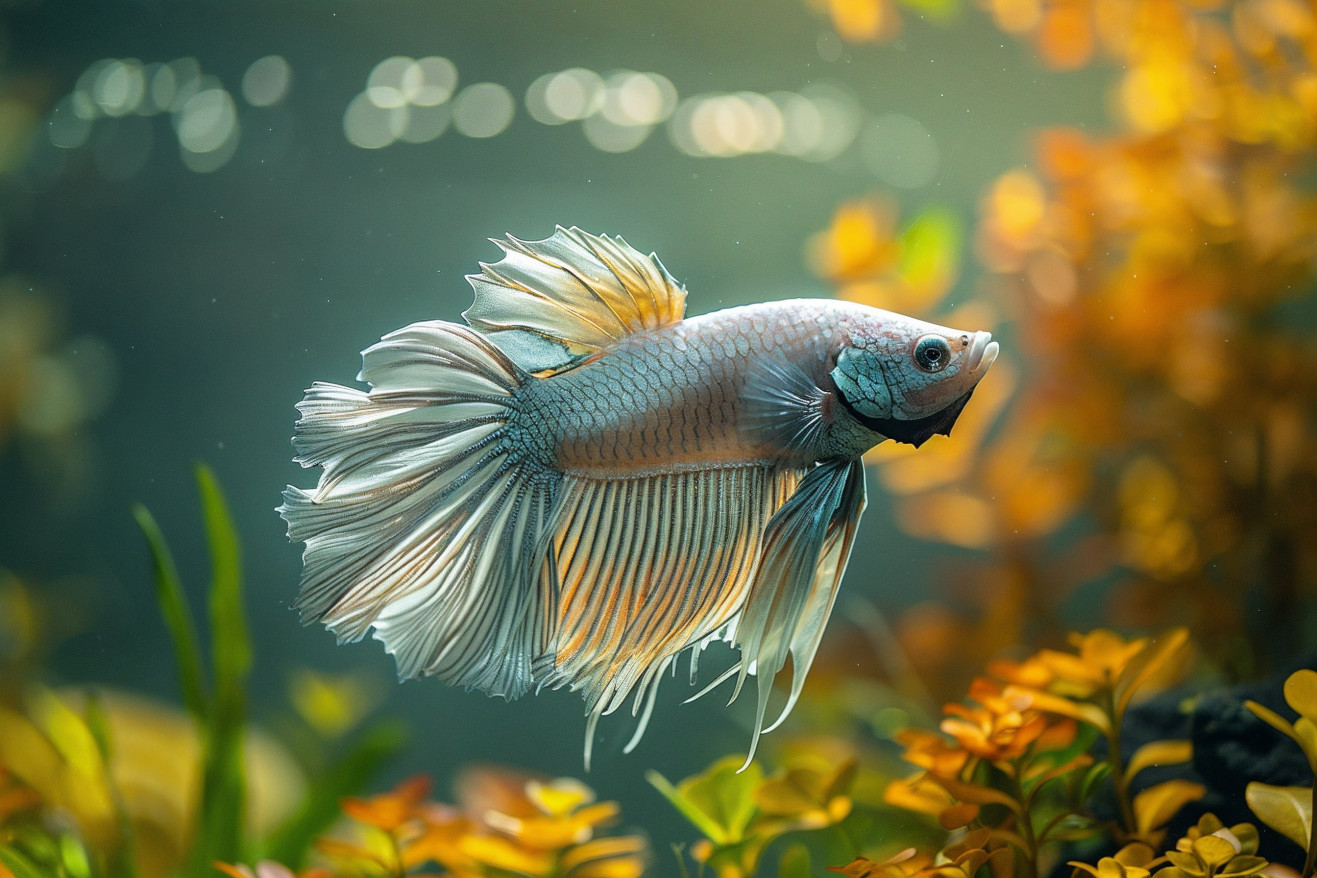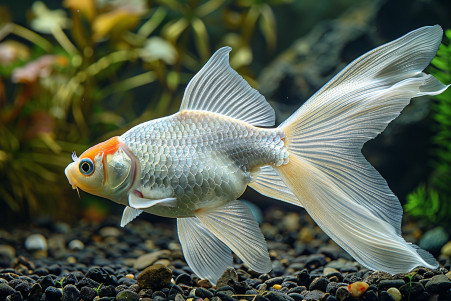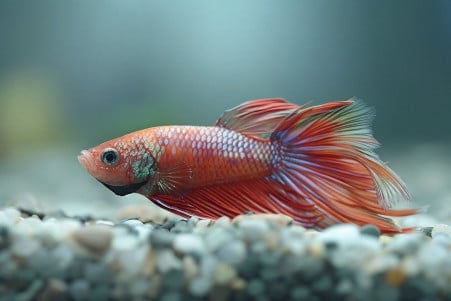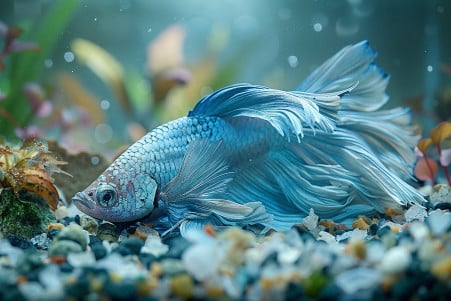Why Is My Betta Fish Turning White? Potential Causes Explained
5 June 2024 • Updated 5 June 2024

If you’ve noticed that your betta fish, which was once a beautiful color, is starting to turn white, you may be worried about what’s going on. There are a few reasons why betta fish may turn white, including natural aging, environmental factors like poor water quality, dietary issues, and health problems like bacterial or fungal infections.
While some of these causes can be addressed and even reversed, others may not be as easy to fix. Below, we’ll explore the findings of fish researchers and veterinarians to help you better understand the factors that may be contributing to your betta fish’s color loss. This way, you can address the root cause and make any necessary changes to help your fish get back to its normal color.
Why is my betta fish turning white?
Water Quality and Betta Fish Color Loss
Water quality is one of the most common reasons that betta fish turn white or lose their color. In fact, things like high ammonia, incorrect pH, and infrequent water changes can lead to stress and color loss in bettas, says hygger. Meanwhile, water parameters like temperature, hardness, and dissolved oxygen can also impact coloration.
If you want to avoid color loss due to environmental stressors, it's important to make sure that you're testing and maintaining the right water conditions. For example, a forum post explains that one person's betta fish started to develop white patches after the water in their tank got dirty in the days leading up to a water change. This makes it clear that it's important to keep the tank clean with good filtration and regular partial water changes, as noted by Veterinary Medicine at Illinois.
The right water conditions include a temperature between 76-81°F, a pH close to 7.0, and no ammonia or nitrites, and low nitrates. You should also use a dechlorinator to remove any harmful chemicals from tap water. In addition, proper aeration and surface agitation will help ensure that the water has enough dissolved oxygen. If you can maintain these conditions, you'll be able to ensure that your betta fish is in a healthy environment that's less likely to lead to color loss.
Nutritional Deficiencies and Betta Fish Color Loss
Bettas are carnivorous and need to eat a certain way to maintain their color. According to Bettafish.org, a lack of essential nutrients, proteins, and fats in their diet can cause bettas to lose their color or become pale.
The importance of a varied diet that includes live or frozen foods such as insects, larvae, and brine shrimp cannot be emphasized enough. As Tropicflow notes, these foods are full of nutrients and are the closest thing to a betta's natural diet, making them essential to a betta's health and coloration.
In addition to these foods, pellets and flakes can be used to add extra nutrition, and the occasional vegetable snack, such as a blanched pea, can help with digestion. BettaFishBay suggests making a homemade betta food that includes the right mix of proteins and vegetables to make sure your betta is getting all the nutrients it needs.
By making sure your betta gets a varied, high-quality diet, you can help prevent color loss and make sure your betta's colors stay as bright as possible. Knowing what to feed these carnivorous fish is important for making sure they stay healthy and look their best.
Age and Natural Color Changes in Betta Fish
As betta fish get older, it's normal for their colors to change or fade over time. Per PetHelpful, one thing that may happen to older bettas is that they will develop white spots or patches that appear and disappear, which is a common sign of aging. The average lifespan of a betta fish is 3-5 years, and PetNannyStore says that age-related color changes may become more noticeable around 2-3 years of age.
It's important to note the difference between color changes that happen as a result of age and those that happen because of the environment or other health factors. BettaFishBay says that if the fish is otherwise healthy, color loss is typically not a cause for concern. That said, bettas can lose their color if they have been stressed for a long time due to a poor environment or an injury.
It's important to make sure that you are taking care of and keeping an eye on an aging betta fish to make sure that they are comfortable and healthy. This may mean that you need to make sure that you are keeping water parameters consistent, that you are feeding them a healthy diet, and that you are keeping their tank environment as stress-free as possible as they age.
Illnesses and Infections That Can Cause Betta Fish Color Loss
Some bacterial or fungal infections can cause betta fish to turn white or lose their color. According to hygger, common illnesses like Columnaris, fin rot, and ich can cause a betta's color to fade.
The Betta Fish Forum even describes how one person's betta started to get white patches that they initially thought was fin rot, but the fish's fins weren't frayed or rotting. Other signs and symptoms to look out for that could be indicative of an underlying illness or infection include changes in the appearance of the fins, discoloration of the body, and labored breathing.
As the Betta Fish Forum explains, it's important to treat the issue as soon as possible with the right medications or remedies to stop the problem and prevent further color loss. This could mean treating the fish with aquarium salt, medications such as malachite green, or changing the water.
To avoid color loss due to an illness or infection, it's important to maintain good water quality and minimize stress, according to hygger. Proper tank care, filtration, and feeding can all help ensure that bettas stay healthy and maintain their color.
How to Get Betta Fish to Color Up
Once the reason for a betta's color loss has been determined and resolved, a betta's color can often be restored. The Betta Fish Forum notes that it can take a few days to several weeks for a betta to regain its color, depending on the cause of the color loss.
To help a betta regain its color, it's important to make sure that their environment is as healthy as possible. This means keeping their tank clean and making sure that they're eating a well-balanced diet. BettaFishBay recommends using a dechlorinator, testing for ammonia and nitrites, and doing partial water changes. In terms of food, they recommend feeding bettas high-quality pellets, freeze-dried foods, and the occasional protein-rich treat to help them regain their color.
In addition to these things, it's important to make sure that a betta isn't stressed out while they're trying to regain their color. This means making sure that their tank is set up in a way that makes them feel safe and secure and that they're not being handled or otherwise bothered too much. If a betta is able to relax and focus on getting better, they should be able to regain their color.
If a betta is able to regain their color, it's important to keep up with their care to make sure that they don't lose it again. This means keeping their tank clean, making sure that they're eating a balanced diet, and making sure that they're not stressed out. If a betta is well cared for, they should be able to keep their color. Even if they do lose it as they age, they can still be a beautiful and interesting pet.
Celebrating the Aesthetic of a White or Light-Colored Betta Fish
While it can be a sign of a health issue, in some cases, a betta fish will lose its color and become white or light in color. If this is the case, the Aquarium Coop forum explains that a white or light-colored betta can still be a pretty and interesting fish.
If a betta has lost its coloration permanently, there are special care needs to consider, including making sure the fish has plenty of places to hide and keeping stress to a minimum, as PetHelpful points out. However, it's important to remember that each betta is an individual and to celebrate that individuality, no matter what color the fish is. In fact, as PetNannyStore explains, accepting the natural changes in a betta's coloration as the fish ages or responds to its environment is an important part of being a good pet parent.
Conclusion: What to Do About Betta Fish Color Loss
There are many reasons why betta fish may turn white or lose their color, including old age, environmental factors, poor nutrition, and disease. However, by knowing the potential causes, you can work to solve the problem and even help your betta fish regain its color.
To prevent and reverse color loss, it's important to keep your betta fish's tank clean, feed it a high-quality diet, and make sure it's not stressed. While some causes of color loss may be unavoidable and irreversible, even a white or pale betta fish can be beautiful and unique. To be a good betta fish owner, it's important to accept the changes in your betta's appearance and appreciate it for its individuality.


